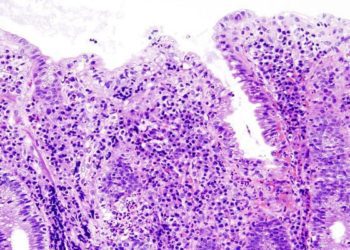Anti-TNF for inflammatory bowel disease after 24 weeks of pregnancy does not affect neonatal outcomes
1. Patients who continued anti-tumor necrosis factor (TNF) after 24 weeks of pregnancy had improved inflammatory bowel disease (IBD) activity and prematurity.
2. Anti-TNF after 24 weeks of pregnancy did not affect neonatal outcomes or cause serious infections in the offspring.
Evidence Rating Level: 1 (Excellent)
Study Rundown: IBD commonly affects young adults, including women of childbearing age. Active IBD during pregnancy is associated with increased rates of prematurity, low birth weight, and cesarean section. Thus, to control disease activity, anti-TNF is commonly prescribed during pregnancy. However, European guidelines currently advise considering stopping anti-TNF treatment after 24 weeks of pregnancy in patients with sustained IBD remission. Yet, there is no evidence that continuation of anti-TNF throughout pregnancy is harmful to mothers and their offspring, whereas stopping anti-TNF treatment may result in IBD relapse. Therefore, there is a gap in knowledge as to understanding whether anti-TNF continuation after 24 weeks of pregnancy reveals any benefits and risks for mothers and their offspring. Overall, this study found that among pregnant women with IBD, the continuation of anti-TNF after 24 weeks of pregnancy was beneficial regarding IBD activity and prematurity, and did not affect neonatal outcomes or susceptibility to serious infections in the offspring. This study was limited by using algorithms rather than clinical data to identify patients with IBD, and potential indication bias in missing mild IBD flares. Nevertheless, these findings are significant, as they demonstrate that continuation of anti-TNF therapy after 24 weeks of pregnancy proved beneficial for the mothers while not adversely impacting their offspring.
Click to read the study in AIM
Relevant Reading: Adalimumab Induction Therapy for Crohn Disease Previously Treated with Infliximab
In-Depth [population-based study]: This nationwide population-based study utilized the French national health data system to identify patients with IBD and pregnancies. Patients with IBD and pregnancies with any infliximab, adalimumab, golimumab, or certolizumab administration or dispensing between conception and 24 weeks were included in the study. Patients with pregnancies exposed to methotrexate, vedolizumab, ustekinumab, or tofacitinib before 24 weeks were excluded from the study. The primary outcome measure was the occurrence of maternal IBD relapse up to six months after pregnancy, adverse pregnancy outcomes, and serious infections in the offspring during the first five years of life. Outcomes in the primary analysis were assessed via marginal logistic models with inverse probability weighting to predict risks and their ratios. Based on the primary analysis, 2,890 patients stopped anti-TNF treatment before 24 weeks, and 2,403 patients continued thereafter. Continuation of anti-TNF was associated with decreased frequencies of maternal IBD relapse (35.8% vs 39%; Adjusted Risk Ratio [ARR] 0.93; 95% Confidence Interval 0.86 to 0.99) and prematurity (7.6% vs 8.9%; ARR 0.82; 95% CI 0.68 to 0.99). There was no significant difference found between anti-TNF continuation or stoppage in terms of stillbirths (0.4% vs 0.2%; ARR 2.16; 95% CI 0.64 to 7.81), small weight for gestational age births (13.1% vs. 12.9%; aRR, 1.01; 95% CI, 0.88 to 1.17), or serious infections in the offspring (54.2 vs. 50.2 per 1,000 person-years; adjusted hazard ratio, 1.08; 95% CI, 0.94 to 1.25). Overall, this study demonstrates that continuation of anti-TNF treatment in pregnant patients after 24 weeks provides benefits in terms of IBD management and did not pose any serious or adverse effects on their offspring.
Image: PD
©2022 2 Minute Medicine, Inc. All rights reserved. No works may be reproduced without expressed written consent from 2 Minute Medicine, Inc. Inquire about licensing here. No article should be construed as medical advice and is not intended as such by the authors or by 2 Minute Medicine, Inc.







